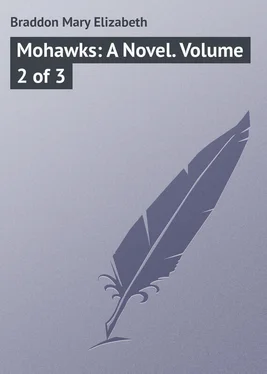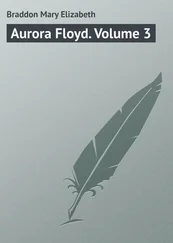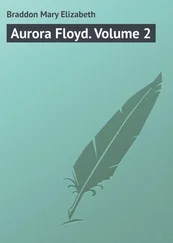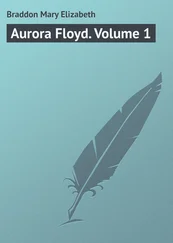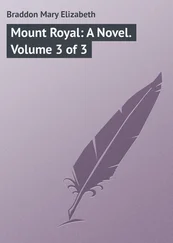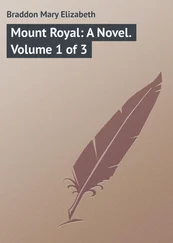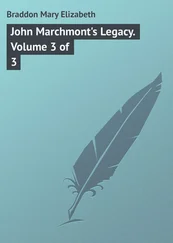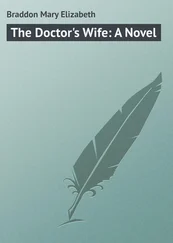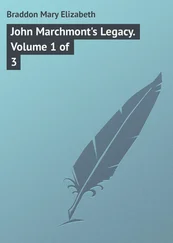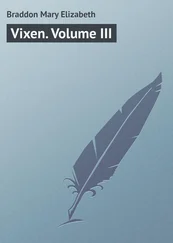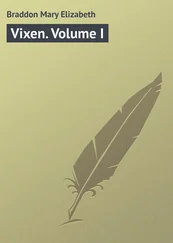Mary Braddon - Mohawks - A Novel. Volume 2 of 3
Здесь есть возможность читать онлайн «Mary Braddon - Mohawks - A Novel. Volume 2 of 3» — ознакомительный отрывок электронной книги совершенно бесплатно, а после прочтения отрывка купить полную версию. В некоторых случаях можно слушать аудио, скачать через торрент в формате fb2 и присутствует краткое содержание. Жанр: foreign_prose, на английском языке. Описание произведения, (предисловие) а так же отзывы посетителей доступны на портале библиотеки ЛибКат.
- Название:Mohawks: A Novel. Volume 2 of 3
- Автор:
- Жанр:
- Год:неизвестен
- ISBN:нет данных
- Рейтинг книги:3 / 5. Голосов: 1
-
Избранное:Добавить в избранное
- Отзывы:
-
Ваша оценка:
- 60
- 1
- 2
- 3
- 4
- 5
Mohawks: A Novel. Volume 2 of 3: краткое содержание, описание и аннотация
Предлагаем к чтению аннотацию, описание, краткое содержание или предисловие (зависит от того, что написал сам автор книги «Mohawks: A Novel. Volume 2 of 3»). Если вы не нашли необходимую информацию о книге — напишите в комментариях, мы постараемся отыскать её.
Mohawks: A Novel. Volume 2 of 3 — читать онлайн ознакомительный отрывок
Ниже представлен текст книги, разбитый по страницам. Система сохранения места последней прочитанной страницы, позволяет с удобством читать онлайн бесплатно книгу «Mohawks: A Novel. Volume 2 of 3», без необходимости каждый раз заново искать на чём Вы остановились. Поставьте закладку, и сможете в любой момент перейти на страницу, на которой закончили чтение.
Интервал:
Закладка:
"Indeed! And pray what is that?"
"Can't you guess?"
"No, upon my honour."
"The very remarkable likeness between that head and Mrs. Irene Bosworth."
Mr. Topsparkle put on his eyeglasses, and scrutinised the picture almost as if it were the first time of seeing it. While he looked, Lavendale was also looking, and his keen eye discovered the painter's signature, Paulo Villari; Venice, 1686.
"Your lordship is right," said Mr. Topsparkle, after a lengthy inspection. "There is certainly a something in outline and feature – and even in expression – which resembles Mrs. Bosworth. Strange that I should not have perceived it before; but although I write at this cabinet nearly every day, I very seldom open yonder door. I bought the picture in Italy so many years ago that I would, if possible, forget the date of the purchase."
"Did you know the original? It is obviously a portrait."
"Yes, I believe it was the portrait or a study of a very handsome model – the Fornarina of some young painter who never became as famous as Raffaelle. No, I did not know the lady. Those chance likenesses are very curious. I have half a mind to make Mrs. Bosworth a present of the picture – and yet I could hardly bring myself to rob this old cabinet of even a hidden treasure. You have been admiring the carving, I hope. It is the finest I ever discovered in nearly half a century of curio-hunting."
"Yes, it is exquisite," Lavendale answered absently.
He had been thinking of the date of the picture, and the place where it was painted. There was no doubt in his mind that this was the portrait of Topsparkle's Italian mistress, the unfortunate lady who had died mysteriously at the house in Soho Square. Topsparkle's pale and troubled look suggested the darkest memories.
The likeness to Irene was of course only a coincidence. Such chance resemblances are common enough. Yes, the face was a lovely one; and this was the face which John Churchill had admired in his dawn of manhood, he himself beautiful as a Greek god, full of strength and genius, a born leader and captain of men, a man of whom it was justly said that since the days of Alexander there had been no greater soldier.
Topsparkle closed and locked the door upon the picture, and put the key in his pocket.
"And pray what was his lordship's news, Mr. Topsparkle?" asked Durnford. "If it be not secret news, which it were an impertinence to ask."
"It is news all Europe must know before the week is out," answered Topsparkle, "although it reaches Bolingbroke by a private hand. He has correspondents all over the Continent, and is ever au courant ."
"Your news, Mr. Topsparkle!" cried Lavendale. "Do not dally with our impatience. Has the Pretender landed on the rugged Scottish coast? Is Gibraltar taken?"
"No; 'tis but one unlucky old woman less in the world, one poor feeble light extinguished. Sophia of Zell, she who should have been Queen of England – the Electress Dowager of Hanover they call her – has died in her prison-house at Ahlen, and his lordship's informant tells him a curious story of her death-bed."
"Prithee, let us have it. I have a morbid passion for death-bed stories."
"'Tis said that in her last hour, after a long interval of silence and seeming unconsciousness, the dying woman lifted herself up suddenly in her bed, and in a firm clear voice called upon the spirit of her cruel husband to meet her before the judgment-seat within a year. Those round her were as scared as if they had seen a ghost from the grave. She lived but to speak those words, and fell back expiring with that summons on her lips."
"I do not envy his Majesty's feelings should he be told of that invitation," said Lavendale. "Whatever his virtues as a king, as a husband he has been pitiless. Never was girlish indiscretion atoned by so terrible an expiation as that living death of thirty desolate years. 'Tis a dastardly story."
"'Twas not altogether his fault. 'Twas his father's mistress, the Countess of Platen, who was at the root of the mischief. 'Twas she who set her spies upon the young Princess, and murdered Königsmark. 'Twas said the fury stamped her heel upon his face as he lay dying."
"The rage of slighted beauty has various ways of showing itself," said Durnford. "But if George as a young man was led into cruelty and injustice by others, his riper age might have inclined to mercy, and were it but for the sake of his daughter, Queen Sophia of Prussia, he should have had compassion upon his wife."
"I have heard the Prince's friends say that should his mother survive her tyrant, 'twas his design to restore her to honour and her title of Queen Dowager; but whatever good intentions his Royal Highness may have entertained on her account are now cut short by death."
"I believe he only gave out such an intention to tease his father," said Topsparkle. "There is an hereditary hatred between the fathers and sons of that house. Here is Prince Frederick, for instance, kept out of England, and frankly detested by both parents."
"Were George wise he would marry his grandson out of hand to his cousin the Princess Wilhelmina, and so fulfil one-half of the Quadruple Alliance. Frederick William is an unmannerly brute, and a miser withal; but he has a long head, and Prussia is steadily rising in the scale of power. England should buckle herself to that nation by every link possible."
CHAPTER II
"I STAND UPON THE GROUND OF MINE OWN HONOUR."
Lavendale left Ringwood Abbey more than ever in love with his former mistress, and savagely jealous of her other admirers, from Bolingbroke downwards. But it was against her husband that his hatred was deadliest. Those dark stories of Mr. Topsparkle's youth and ripening years had taken a strong grip upon Lavendale's mind. He had been a profligate himself, and his own wild youth gave him but little justification for setting up as a moralist; but Lavendale's sins had been the vices of an accomplished gentleman, sunning his follies in the full blaze of notoriety, parading his amours, his gambling adventures and duels, advertising all his laxities of conduct and opinion, glorying in his shame; while Topsparkle's vices had been dark and secret, obscure as the rites of an antique religion, only guessed at dimly by the multitude.
To Lavendale the very presence of the man inspired loathing, albeit Mr. Topsparkle was generally esteemed a very pretty fellow, and a wonder of careful preservation and artistic treatment.
"By lamplight our dear Topsparkle might pass for forty-five," said Bolingbroke, discussing his late host at White's one evening after the opera, "and yet I have reason to know that he is nearer seventy than sixty – and upon my soul, gentlemen, it is a very meritorious thing for a man of seventy to pass for young. 'Tis not so easy as you young gentlemen think."
"There is a quiet elegance about Topsparkle which is very taking," said Mr. Chevenix, a prosperous barrister; "and when one remembers that his father made his money in the City, and that he is only one generation removed from hides and tallow – "
"There you are mistaken, my dear Chevenix," interposed Asterley; "the elder Topsparkle was a drysalter."
"And pray does not that mean hides and tallow? I thought they were all one," said Chevenix, with a languid fine-gentleman air.
"Alderman Topsparkle was a very clever fellow," said Bolingbroke. "You are not to suppose that he made his vast fortune all in the beaten way of trade, out of pickles and saltpetre. 'Tis said he speculated largely on 'Change; and it is also said that before the Peace of Utrecht he used to buy up all the spoiled gunpowder in the country and sell it again to a very great man, whose name I would be the last to mention for two good reasons. He is dead; and he was once my friend."
Читать дальшеИнтервал:
Закладка:
Похожие книги на «Mohawks: A Novel. Volume 2 of 3»
Представляем Вашему вниманию похожие книги на «Mohawks: A Novel. Volume 2 of 3» списком для выбора. Мы отобрали схожую по названию и смыслу литературу в надежде предоставить читателям больше вариантов отыскать новые, интересные, ещё непрочитанные произведения.
Обсуждение, отзывы о книге «Mohawks: A Novel. Volume 2 of 3» и просто собственные мнения читателей. Оставьте ваши комментарии, напишите, что Вы думаете о произведении, его смысле или главных героях. Укажите что конкретно понравилось, а что нет, и почему Вы так считаете.
